More than 500 train fare dodgers have been caught in Birmingham in just FIVE DAYS.
A total of 522 people were caught at just three stations on the busy Cross City line during the first week of a new operation from British Transport Police and London Midland.
Transport cops linked up with revenue protection teams from the train operator to pull aside fare dodgers at Longbridge, Northfield and Sutton Coldfield stations during the first week of Operation Loop.
Last week - between Monday January 19 and Friday 23 - officers issued 522 £20 penalty fines, prosecuted 14 people for travel fraud, reported three people for cannabis possession and also handed out around 3,000 Text British Transport Police cards.
Inspector Chris Casey, of British Transport Police, said: “The operation received a lot of positive feedback from passengers who were pleased to see London Midland’s new revenue teams checking tickets and dealing with people who choose not to pay their fare.
“We know from our experience that there is often a link between fare evasion and anti-social behaviour. British Transport Police will continue to work with London Midland to ensure that we respond to passenger concerns relating to their safety on the railway.”
British Transport Police said that its own ‘What Matters to You’ survey, from November 2014, listed fare evasion from Longbridge station as one of the top gripes.
• Just last month one of the UK’s biggest train fare dodgers was banned for life from any senior role in the financial services industry.
Jonathan Paul Burrows, a former managing director at Blackrock Asset Management, was barred by the Financial Conduct Authority from taking any responsible role in the financial services industry.
Burrows was exposed as one of the UK’s top fare dodgers after it came to light that he had saved himself almost £43,000 over several years by exploiting a loophole at the ticket barriers.
The East Sussex commuter boarded the London-bound train at Stonegate, a rural station with no ticket barriers. When he arrived at Cannon Street station in London, he tapped in using an Oyster card, paying a £7.20 fare, rather than the £21.50 cost of his journey.
Burrows avoided prosecution after making an out-of-court-settlement with Southeastern railways, but had to resign from his high-flying job.
In a statement after the FCA ruling, Burrows said: “I have always recognised that what I did was foolish. I have apologised to all concerned and reiterate that apology publicly today.”
The £43,000 that Burrows repaid to Southeastern trains was calculated on the basis of single fares. This meant the settlement cost him £20,000 more than if he had bought season tickets.




















